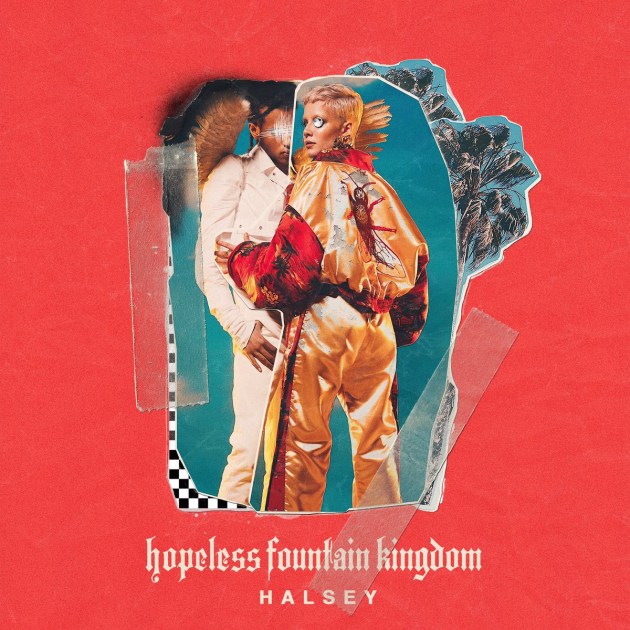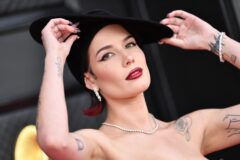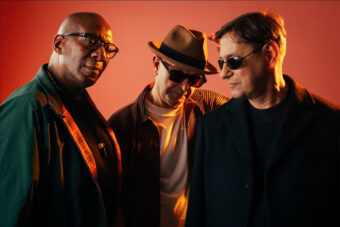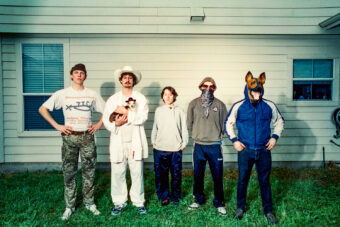Halsey is a name-brand pop star without a hit single to call her own. Though she’s become omnipresent on red carpets and awards show stages, the 22-year-old singer is largely known for duetting on the Chainsmokers’ “Closer”—a smash for the ages, but one which she might rather forget. That aside, she is the rare young superstar whose commercial success has been based more on albums than singles: Her debut full-length Badlands is certified platinum despite not landing a song anywhere near the Top 40.
Still, this can be more good than bad, insofar as it conveys a more than surface-level connection between the artist and the fan. So perhaps we should take a particular interest in her new album hopeless fountain kingdom, which arrives with the expectation that her career will take the next step forward. To that end, results are what you want to make of them. Despite its lead single “Now or Never” embarking on a torturously slow trudge up the charts, the album will almost certainly debut at No. 1, even if it provides at best a foggy vision for Halsey’s future.
So why do Halsey’s fans love her albums so much in the first place? If she has anything to offer as an artist, it’s an obvious authenticity that may naturally elude slightly older people like, well, you and me. Even before being accepted into the clutches of the industry, she started building a fanbase via YouTube covers and Tumblr posts. With her blue hair, verbose Twitter account, and identification as “tri-bi” (biracial, bisexual, bipolar), Halsey is the exact kind of millennial pop star that major record label would have wanted to engineer in a lab if she didn’t already exist. Badlands puts an acutely contemporary spin on teenage angst, with tightly-coiled synth-pop ballads that unclench theatrically as if splintering into fields of metallic shards. Nonetheless, the appeal of the album if you didn’t already buy into her persona was limited—Badlands is mostly a one-note dirge, with no color or humor, and a precious few songs that float or groove.
hopeless fountain kingdom doesn’t abandon that blueprint wholesale, but it does begin to expand the borders of the Halsey ecosystem. “Now or Never,” in theory, would be a perfect example. Its greyscale production and minor key melodies form a direct line back to Badlands, but it has a far stickier and more appealing chorus than anything on that album. Alas, that chorus is, as many have pointed out, a nearly 1:1 rip-off of Rihanna’s cascading kiss-off “Needed Me,” which doesn’t speak very highly of Halsey’s ability to find herself within a growing constellation of influences.
Better, though, is “100 Letters,” the album’s first real song after a short intro. Written with the producer Ricky Reed—who has been most successful leaning into kitsch with collaborators like Jason Derulo and Meghan Trainor—the song has a distinct lightness of touch that is absent from much of either Reed’s or Halsey’s back catalog. It also flashes Halsey’s talent for blunt, but clever, lyric writing. “I said, ‘I’m not something to butter up and taste when you get bored’,” she sings. “Cuz I have spent too many nights on dirty bathroom floors / to find some peace and quiet right behind a wooden door.” With its rippling hand drums and defiant but restrained chorus, the song exudes the elusive sort of maturity and growth we expect as an artist’s career progresses.
Unfortunately, “100 Letters” careens into “Eyes Closed,” the second single. That one opens with a prickly guitar figure that pleasantly recalls The xx, but is quickly swallowed by what sounds like an old Weeknd song recently discovered by paleontologists, which is not exactly surprising considering that Abel Tesfaye himself co-wrote it. What follows is an album that similarly doesn’t stray to too far from its predecessor, with brooding, morose songwriting grafted onto ugly, inert arrangements.
You can see the glimmer of something novel in “Walls Could Talk,” which hangs on a violin riff and a stuttering chorus that recalls the late-‘90s pop-R&B of, say, Pink’s debut album—territory generally not yet mined by millennial Aaliyah tomb raiders. The rap-isms of “Don’t Play”—”double cuppin’ in the ride” etc.—feel sudden and put-on, but the song is airy and spacious, and Halsey asserts herself as a believably commanding presence within it, suggesting again that she will get better the more she leaves the initial iteration of her music behind.
All of that is one album away, though, at least. For now, we’re left with a deeply imperfect and too-often derivative album that is not without its charms, but won’t exactly help form the connection with the average listener that Halsey long ago established with her core fanbase. She will have time.





